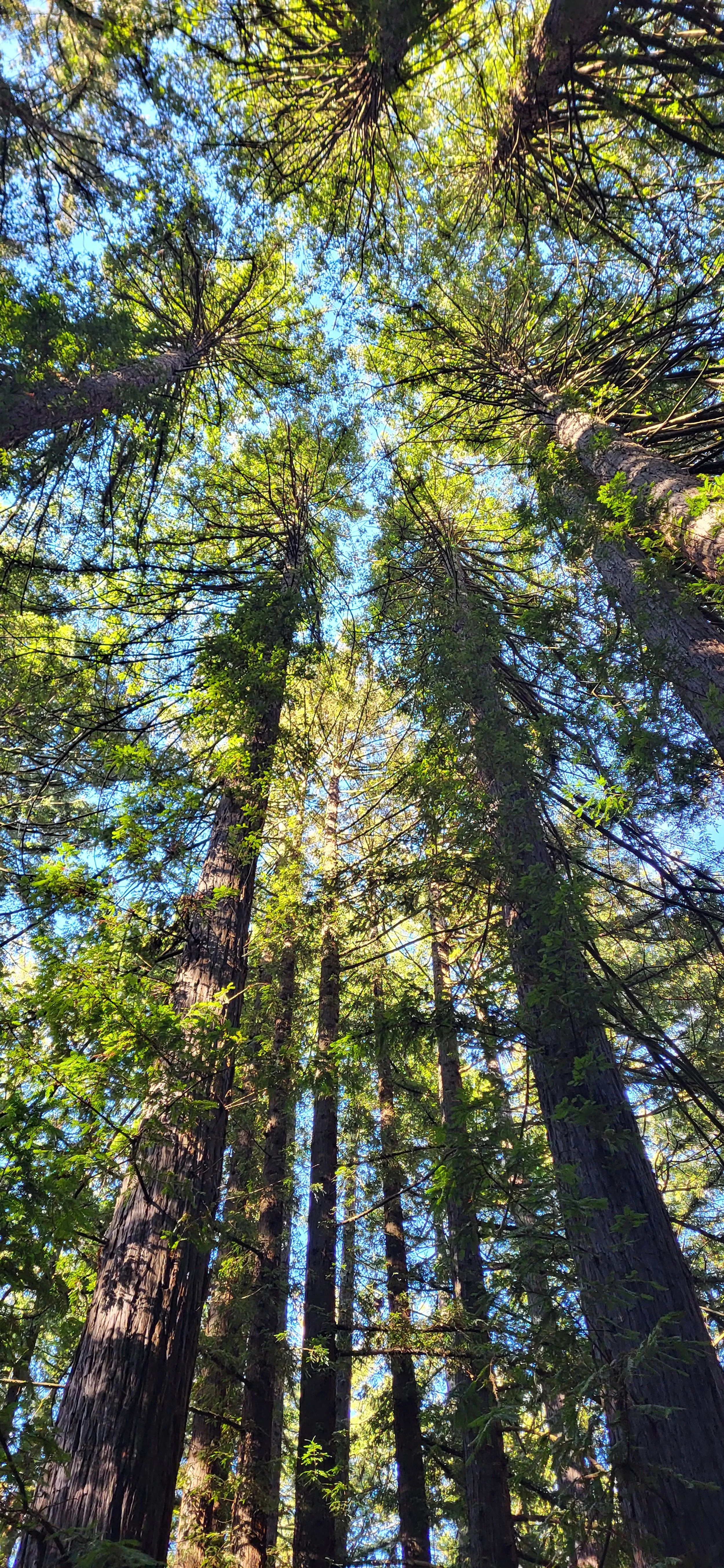
Climate Stories
Redwood Resilience
In August 2020, the CZU Lightning Complex fires in California devastated the forest that I grew up exploring. I grieved the loss of a beloved natural sanctuary; a place where I found peace in the enduring constancy and abiding permanence of Nature. I read stories about how the fires rampaged through the redwood forests and destroyed many buildings of Big Basin State Park, where I had camped as a child. I felt a visceral reaction to this loss. I attempted to soothe myself by remembering that the redwoods are naturally fire-resistant and turned to memories of standing inside the fire-scars of redwood trees that continued to grow and thrive. Once the fires were out, I anxiously awaited news about whether any of the trees survived. Could they withstand rampant forest fires such as this? I was relieved to learn of initial reports that suggested many of the trees had in fact survived. Two years after the fire, Big Basin State Park reopened. The majority of ancient redwood trees had survived. Today, four years later, the tree trunks are blackened by fire, contrasted by bright green new growth from their limbs above. New growth springs verdant from the forest floor. These signs of healing further deepen my appreciation of the resiliency of Nature. I look forward to returning to the forest one day soon to witness its recovery firsthand.
Rebecca Edgecumbe, MA, BCBA
Ocean Connections
As a child, I was always in the water. I loved it – spending all day at the pool in the summer and refusing to leave the beach every evening on family vacations. As an adult, I found that all my travel led me to tropical islands, so it wasn’t a stretch to finally get scuba certified in 2017.
For me, scuba diving started as a way to challenge myself and experience a new world beneath the ocean’s surface. I was only aware of the thrill of each new dive and what might be waiting for me underwater and less aware of the environmental impact I was having on each trip. Then a colleague told me about his recent trip to Honduras, to a small island called Roatan with a large diving community. True to nature, I immediately booked a month-long trip to explore the reefs and witness the string of pearls phenomenon myself.
Spending a month with one community and diving the same reef, I quickly became aware of the side effects of diving and tourism on the marine life. I watched, dismayed, as trash piled up on the beaches throughout the week from tourists visiting from cruise ships, and some of it even made its way deeper into the ocean and made appearances beside the eels, lobster, and fish making their homes in the reef. I watched as less experienced divers brushed up against the coral with their fins, damaging it or disrupting the fish, and I kept hearing about the importance of protecting the ecosystem and in turn protecting the communities that call it home. While there, the local community was circulating a petition to have petrochemicals sunscreens banned from the island. These chemicals can contribute to coral bleaching, cause deformities in coral, and affect their reproduction. This is especially important in Honduras, efforts are being made to outplant coral fragments from coral nurseries to help restore the reef. I attended a beach clean-up and petition-signing event, and felt empowered by our collective action.
I reflected a lot about that trip on my return home, I realized I could take a more responsible approach to diving and decided to start focusing on how I could give back to the ocean. My first steps were to switch to a mostly plant-based diet and only occasionally eat fish that was locally and sustainably sourced. I also started looking for opportunities to volunteer with organizations dedicated to pro-climate action, which is how I found the ABA Climate Coalition. When I returned to Roatan in 2024, I received my Advanced Open Water certification and improved my buoyancy & dive skills, which has allowed me to safely collect trash in crevices and on the sea floor without disrupting or harming the reef. I also completed the Roatan Marine Park Coral Ambassador program where I got to dive in the coral nursery and learned how to clean the trees and ‘coral babies’ to protect them from disease and predators, then replant coral fragments to repopulate the reef. This year, I completed the Roatan Marine Park Lionfish Hunting workshop. Although the lionfish population has seen a decline in Roatan over the past few years, they are still a danger to the native fish species. The Marine Park license allows me to safely hunt lionfish to help eliminate them from the reef. Now when I dive and in my daily life, I am much more aware of the ecosystems I’m helping to protect.
Erin Mayberry, MA, BCBA

Share Your Climate Story!
If you’re a member, send us your climate story with a photo using the form below, and we’ll include it on this page.





